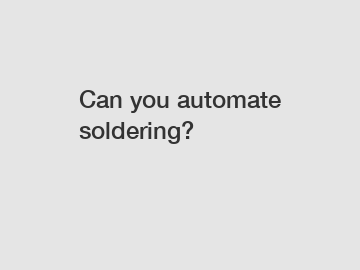Nov. 25, 2023
Machinery
Can you automate soldering?
Soldering is a fundamental process in the electronics industry, used for joining components and creating electrical connections. Traditionally, soldering has been performed manually by skilled technicians who carefully apply heat and solder to the desired areas. However, with the advancements in technology, many industries have embraced automation in their manufacturing processes. This begs the question: Can you automate soldering? Let's delve into this topic and explore the possibilities.
The Need for Automation in Soldering.

Soldering is a repetitive and time-consuming task that requires accuracy and precision. Manual soldering, while effective, is subject to human errors such as inconsistent soldering techniques and imperfect joint quality. Additionally, the demand for faster production rates and higher product quality has driven industries to explore automation alternatives.
Advantages of Automating Soldering Processes.
1. Increased Efficiency: Automation allows for faster soldering processes, reducing production time and increasing output rates. Machines can work consistently without experiencing fatigue, ultimately improving overall efficiency.
2. Improved Quality Control: Automated soldering systems can be programmed to perform consistent soldering techniques, ensuring uniform joint quality and reducing the risk of defects. This leads to improved product reliability and customer satisfaction.
3. Enhanced Safety: Soldering involves working with high temperatures, hazardous fumes, and potentially toxic materials. By automating soldering processes, companies can reduce the risk of accidents and injuries to human operators.
4. Cost Savings: While initial investment costs may be higher when implementing automation, in the long run, the cost savings can be significant. Automated systems can reduce labor costs, minimize material waste, and limit the need for rework or repairs.
Further reading:The Challenges of Automating Soldering.
Automating soldering processes is not without its challenges. Here are a few key considerations:
1. Complexity of Components: Soldering often involves intricate and delicate components, which may require human dexterity and adaptability. Automating the soldering of these complex components can be challenging, requiring specialized equipment and programming.
2. Customization and Flexibility: Manual soldering allows for quick adjustments and changes during the process to accommodate specific requirements. Automating the same level of customization and flexibility can be difficult, especially when dealing with diverse product ranges or low-volume production runs.
3. Initial Investment: Implementing automated soldering systems can have a high initial cost, including purchasing specialized equipment, training employees, and modifying existing production setups. Smaller companies or those with limited budgets may find it challenging to justify the investment.
Automation in Soldering: Moving Forward.
While complete automation of soldering processes may not be feasible in all scenarios, hybrid solutions that combine both manual and automated techniques are increasingly being adopted. Semi-automated soldering systems can leverage the benefits of both approaches, striking a balance between efficiency, quality, and customization.
In conclusion, automation in soldering offers numerous advantages such as increased efficiency, improved quality control, enhanced safety, and cost savings. However, it also presents challenges related to component complexity, customization, and initial investment costs. Therefore, it is crucial for companies to assess their specific needs, product requirements, and resources before deciding on the level of automation to incorporate into their soldering processes.
If you are interested in automating your soldering processes or need assistance in selecting a reliable supplier for soldering equipment, please don't hesitate to contact us. We have a team of experts ready to support you in making informed decisions and achieving your automation goals.
For more information, please visit benchtop soldering robot, Glue Dispenser Machine For Sale, automatic screw driver with feeder.
Further reading:Previous: Which turning conveyor is the best choice for optimizing B2B purchase decisions?
Next: What are the advantages of using multiple functions packaging machines?
Related Articles
If you are interested in sending in a Guest Blogger Submission,welcome to write for us!
All Comments ( 0 )